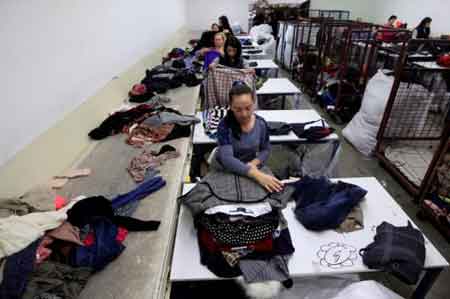
|
The global financial crisis hit hard in central and eastern Europe, but one industry has thrived: second-hand clothing stores. While in western Europe the squeeze on household finances prompted many consumers to turn to discount retailers like Primark (ABF.L), their peers further east - where wages are significantly lower - have shifted to the used clothing sector. Second-hand clothes retailers in Hungary,Poland,Bulgaria and Croatia have grown rapidly and, as the pace of income convergence between the West and Eastern Europe slows, they are investing millions of euros to expand their businesses further. Brisk trade in Bulgaria, for example, has prompted one company - Mania - to open new stores in Romania and Greece, while in Hungary major player Hada is opening a 1.6 million euro sorting hall to cope with booming demand. These companies and their rivals source their goods from western countries, buying them from so-called cash-for-clothes firms who pay people to recycle their old or unwanted outfits. Some are in pristine condition with the original price tag still attached. There is no shortage of demand for their wares in central and eastern Europe, where most people are in lower-income brackets, by western European standards. In Hungary,central Europe's most indebted nation, where the economy has yet to catch up to pre-crisis levels despite a jump in growth this year, the import of used clothes has more than doubled from 2008 figures to 56 million euros last year. Hada, which has 60 stores in Hungary and controls about a third of the market by its own estimate, will open the 1.6 million euro sorting hall in eastern Hungary next year, adding 155 jobs to bring its workforce to around 900 people. The firm imports 30-40 tonnes of used clothes per week from Britain- its main sourcing market. It has grown into an operation with annual turnover of 32.4 million euros ($40 million), from a family business started in 1995 and run from a decrepit hall in a remote village near the border with Ukraine. In Poland, the region's biggest economy, over 40 percent of people shop for second-hand clothes regularly and 100 million euros worth of used clothes were imported in 2013, up from about 60 million on average in the previous years. They mainly come from Britain, Germany and Scandinavia. Poland was the only EU member to avoid a recession during the global crisis but its recovery is also slowing as the Ukraine conflict and weak European growth are taking their toll. However the consumer spending squeeze in western Europe has had a knock-on effect for used clothes sellers further east. "Everything's got more difficult recently, because of the crisis, and so has this business," said Jolanta, who has worked in one of Warsaw's shops for six years. "People in England are now getting poorer, and the clothes they get rid of - they are nowhere near as good as they used to be."
|
全球金融危机重创了中欧和东欧,但二手服装店的生意却兴隆起来。 当西欧人家庭开支拮据的时候,很多消费者转去打折零售店,比方普联超市(Primark ABF.L)。而东欧人因工资要低得多,则转入了旧衣服市场。 二手衣服零售商在匈牙利、波兰、保加利亚和克罗地亚迅速增加,鉴于西欧和东欧的收入增长有差距,他们正在投入数百万欧元来拓展生意。 例如,保加利亚二手服装市场的活跃促使曼妮雅公司(Mania)在罗马尼亚和希腊增开新店面。同时,匈牙利的市场老大哈达(Hada)将开张一个价值160万欧元的分拨中心,来应对不断增长的需求。 这些公司和他们的竞争同行都从西欧的一些旧衣变现公司进货,他们从当地人那里收购旧货和弃货。有些衣服还是新的,价签还没被撕去。 中欧和东欧对服饰的市场需求不少,用西欧的标准衡量,东欧的大多数人都属于低收入人群。 匈牙利是中欧债务最多的国家,即使今年经济有所起色,还是达不到危机前的水平。匈牙利去年进口了价值5600万欧元的旧衣服,比2008年的两倍还多。 哈达在匈牙利有60家店面,据他们自己估计占有了该国三分之一的市场。它的160万欧元的分拨中心将于明年在匈牙利东部开业,届时将提供155个工作岗位,其员工总数将达到900人。 该公司每周从其主要货源国——英国进口30-40吨的旧衣服。1995年它创办于靠近乌克兰边境的一个边远小村落,是个在简陋棚子里的家庭生意,如今年销售额已经达到3240万欧元(合4000万美元)。 波兰是这个地区最大的经济体,有40%的人经常在二手服装店购物,前几年平均每年进口价值6000万欧元的旧衣服,2013年达到了一亿欧元,主要来自英国、德国和斯堪的纳维亚半岛。 波兰本来是欧盟中唯一在全球危机中躲过了萧条的成员国,然而乌克兰危机和欧洲增长的疲弱也让波兰的复苏相当缓慢。 西欧消费者缩减开支,却对旧衣服东进销售产生了连锁反应。 约兰塔(Jolanta)已经在华沙(Warsaw)的一家旧货店里工作六年了,她说:“最近越来越艰难,危机加深让生意难做。” “英国人也比以前更穷了,他们不要的旧衣服——也和原来根本没法比了。” (翻译:smartypants 编辑:Julie) 扫一扫,关注微博微信
 
|
|
|